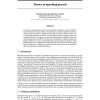Free Online Productivity Tools
i2Speak
i2Symbol
i2OCR
iTex2Img
iWeb2Print
iWeb2Shot
i2Type
iPdf2Split
iPdf2Merge
i2Bopomofo
i2Arabic
i2Style
i2Image
i2PDF
iLatex2Rtf
Sci2ools
120
click to vote
NIPS
2008
2008
Theory of matching pursuit
We analyse matching pursuit for kernel principal components analysis (KPCA) by proving that the sparse subspace it produces is a sample compression scheme. We show that this bound is tighter than the KPCA bound of Shawe-Taylor et al [7] and highly predictive of the size of the subspace needed to capture most of the variance in the data. We analyse a second matching pursuit algorithm called kernel matching pursuit (KMP) which does not correspond to a sample compression scheme. However, we give a novel bound that views the choice of subspace of the KMP algorithm as a compression scheme and hence provide a VC bound to upper bound its future loss. Finally we describe how the same bound can be applied to other matching pursuit related algorithms.
Compression Scheme | Information Technology | Matching Pursuit | NIPS 2008 | Sample Compression Scheme |
Related Content
| Added | 30 Oct 2010 |
| Updated | 30 Oct 2010 |
| Type | Conference |
| Year | 2008 |
| Where | NIPS |
| Authors | Zakria Hussain, John Shawe-Taylor |
Comments (0)

